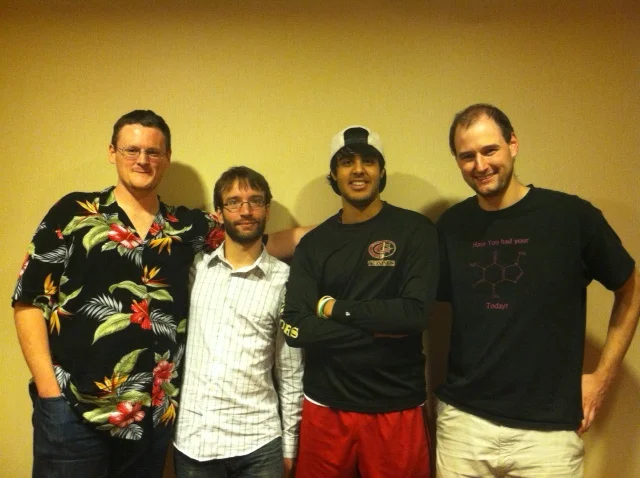Max Aeschbacher, Josh Parks, Arjun Dhir, Alex Dezieck
Winning the Mini Spingold
by Max Aeschbacher
Having agreed to play two national pair events with a young but talented partner named Arjun Dhir, I was looking forward to my trip to the Atlanta NABC. Not long before the tournament, I got an e-mail from another friend, and erstwhile teammate, Josh Parks. He was looking for teammates for the tournament. I tried to set him up with Arjun for the weekend, and he suggested that we blow off the pair events and just play the Spingold with him. We quickly agreed. Our team was Arjun (who insisted on being captain), Josh, Alex Dezieck (who attended college with Josh at Wesleyan), and me.
We entered the 0-5000 Mini Spingold and were seeded 26th out of 29 entering teams. Seeding for this event is done by masterpoints, and since I was the only member of the team to have more than 1000 points (let alone 1500), we were seeded near the bottom. We got to play the number 4 seed in the first round.
Each match in this event is 56 boards long, and played over two sessions. We had a comfortable lead at halftime. Despite a couple of disastrous results in the third quarter, we retained a small lead. The fourth quarter didn’t go very well, and the match ended in a tie. This called for an eight-board playoff. My table finished the hands relatively quickly, and all eight scores were positive for our side. We were a bit worried, because two of the games we bid made slam due to lucky card position, but neither should really be bid. We waited literally an hour for our teammates to finish at the other table. All was well, and we won the playoff by 20 IMPs! We would live to fight another day.
The second day I was a bit dismayed to find that we had drawn a friend of mine who I knew to be an excellent player, and no stranger to high-level competition. She was playing with a client, and her teammates were a married couple playing a strong club system. Arjun and I played against the married couple. On the second board of the match, they bid to a slam, went down, and started fighting about it. Arjun and I exchanged knowing glances. We could win this match. All we had to do was stay quiet and let our opponents trip over their own shoelaces. Of course it didn’t hurt that we bid, and made, a couple of aggressive slams.
The third day we drew a team of young Taiwanese pros, playing (somewhat inexplicably) with an older gentleman from Ohio. The match was tight from the beginning, but in the third quarter we started to fall apart. Four of our contracts got doubled. The fact that one of them made did little to assuage our despair about the one that went for -1100. Down by 29 IMPs going into the 4th quarter, we played steady, and our teammates played double-dummy. We won the quarter by 34 to win the match by five.
For the semi-finals we got to play behind screens. This was a first for me, but it took no time for me to love it. It’s a much more relaxed atmosphere. Playing with a 17-year-old who constantly bounces his leg, it was refreshing to have no risk of unauthorized information. Playing against another experienced partnership, and another strong club system we immediately applied pressure by bidding an aggressive, vulnerable game, and making it on slight misdefense. At the half, we found ourselves up 35. Our opponents found a way to go down in four freely bid slams in the second half, and we won by more than 50. While our opponents didn’t officially concede the match until it was over, they started talking about how we had won during the third quarter. I don’t think this was a tactic, but if it was, it didn’t work. Arjun and I maintained strong focus, and made sure we actually won to make it to the finals.
In the finals we drew a strong team from the upper East Coast region of the U.S. Knowing we had our work cut out for us my girlfriend gave me a much-needed pep talk the night before the match. “Don’t sell yourself short,” she said. “You and your teammates are acting like this team is going to beat you, and I don’t see any reason why you can’t win.”
“You’re right,” I said. “I’m going to win, and I’m going to have fun doing it.”
“That’s better,” she said.
In the first three quarters of the finals we saw small gains: four IMPs in the first, four more in the second, and one more in the third. Up by nine going into the final quarter I knew we would have to play well. One bad result could see all these gains evaporate instantly.
Disaster struck when a bidding misunderstanding landed us in a 4-2 spade fit at the four-level. I made what turned out to be a smart decision to go to the bathroom and let a kibitzer turn the dummy, and watch the carnage.
When I returned, I asked my screen-mate what the score was. He exhibited nothing but class, sportsmanship, and sympathy, when he quietly mouthed “Five hundred”.
Next came the toughest bidding decision I faced in the entire event. I held the following hand:
K942 AKJ82 --- AK74
The auction went as follows:
(P) 1H (3S) P
(P) ???
No one was vulnerable. What was I to do? I have a good hand, but I know my partner bids very aggressively. If we had a game, he might very well have done something over 3S. Double is out of the question. Partner will never pass it, and the last thing I want to do is try and recover after partner bids some loud number of diamonds. Four hearts, four clubs, and three no trump could all be right, but I’m guessing blind.
Ultimately I decided to pass. I didn’t have a vulnerable game-bonus to protect, and this would, at least, ensure a plus score. Indeed, we got plus 200 when we set them four tricks, and we lost six IMPs when the other table got to the making 4H spot.
I knew well when I made my choice that I might be losing a few IMPs, but I was willing to lose IMPs going plus. I wasn’t willing to face the psychological implications of losing IMPs because I traded a plus for a minus. Having polled a number of experts since then, I found an overwhelming majority agreed with my choice to pass.
On the penultimate board, everyone at the table was stressed and tired. My partner and I had another mild bidding misunderstanding that resulted in a director call. I felt sick. I was sure we had lost. All I could do was hope for no tough decisions on the last board. I got my wish. The opponents bid to an easy 3NT contract and made five. Time to compare.
With our teammates waiting for us we added the scores quickly. The penultimate board was a gain of nine IMPs when our teammates brought home a doubled part-score. The last board was a push. We had lost the quarter by one, to win the match, and the event, by eight. We hugged, and basked in the shock of the reality that we were national champions.
I’ve reflected a LOT on all the ways in which we got lucky to win, and even more on all the ways we easily could have lost (or not even made it past the first day). I’ve reached a few important conclusions that should be relevant to a beginner going to her first regional, or a seasoned pro gearing up for an NABC:
Play Every Trick – Don’t get locked into a rhythm of following suit. Every bid, and every card you play is important. Partner is watching your signals. Don’t play lazy bridge.
Don’t Concede Defeat – Assume you will win the match until you’ve added the final scores. If you let your speech, or even your body language suggest that you’ve given up on the match, your opponents will take advantage. They’ll outbid you. They’ll double you. They’ll make their contracts when you misdefend.
Make a Plan – Count your tricks every time you declare. If you don’t have enough to make your contract, figure out the best way to try for extras.
Defend – The opponents will bid a lot of beatable games and part scores. Defend carefully and thoughtfully. Watch partner’s signals. Remember the auction. Beating games is a bigger source of IMPs than making them.
Breathe – It can be extremely stressful to play in the late stages of a KO, or the late rounds of a pair event when you know you’re doing well. Stay calm and treat each hand like it’s the first hand of the session.
Get the Easy Hands Right – Most big bridge events are won and lost because the winners made fewer mistakes than everyone else. There were certainly some big flashy results for our side in this event, but the way we won was by playing normal bridge most of the time. You don’t need to run a squeeze or engineer an endplay on every hand. Most of the tools you need to win are already in your arsenal: count your tricks, take your finesses, bid game when you’re supposed to, and maintain focus throughout the session.
Bid Over a Strong 1C Opener – We won a lot of IMPs by bidding in the face of strong 1C openers. On one hand where our opponent opened a strong 1C, the auction had been preempted to the 6-level before either he or his partner got to show a suit (our final result on that hand was +200 for 7CX down 1). Be careful if you’re vulnerable, but when you’re not, bid as much as you can stand to!
Don’t Sell Yourself Short – All this talk in my head about the ways we could have lost is irrelevant. Reflection is important, but the only reason we had the chance to be lucky enough to win, is because everyone on my team did so many things RIGHT.


